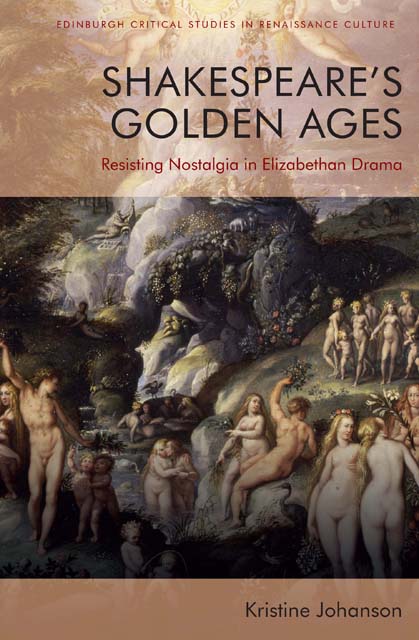Book contents
- Frontmatter
- Contents
- Dedication
- Series Editors’ Preface
- Prologue
- Note on Citation
- Introduction: Rethinking Nostalgia
- 1 Against Nostalgia: Looking Forward to the Future in the Queen’s Men’s Plays and Marlowe’s Tamburlaine
- 2 What Merry World in England? Nostalgic Paroemia and The Second Part of Henry VI
- 3 In the Mean Season: Richard II’s Absent Hospitality
- 4 The Lessons of Nostalgia in Julius Caesar and Sejanus
- Conclusion: Resisting Nostalgia
- Bibliography
- Index
2 - What Merry World in England? Nostalgic Paroemia and The Second Part of Henry VI
Published online by Cambridge University Press: 18 November 2022
- Frontmatter
- Contents
- Dedication
- Series Editors’ Preface
- Prologue
- Note on Citation
- Introduction: Rethinking Nostalgia
- 1 Against Nostalgia: Looking Forward to the Future in the Queen’s Men’s Plays and Marlowe’s Tamburlaine
- 2 What Merry World in England? Nostalgic Paroemia and The Second Part of Henry VI
- 3 In the Mean Season: Richard II’s Absent Hospitality
- 4 The Lessons of Nostalgia in Julius Caesar and Sejanus
- Conclusion: Resisting Nostalgia
- Bibliography
- Index
Summary
[I]f more over we can sette a parte al affections, as fretting cares & thoughtes, dolefull or sorowfull imaginations, vaine feares, folysh loves, gnawing hates, and geve oure selves to lyve quietly, frendlie, & merily one with an onther, as men were wont to do in the old world, when this countrie was called merye Englande, and every man to medle in his own matters, thinking theim sufficient, as thei do in Italye, and avoyde malyce and dissencion, the destruction of commune wealthes, and private houses: I doubte not but we shall preserve oure selves, bothe from this sweatinge syckenesse, and other diseases also not here purposed to be spoken of.
In his book on the sweating sickness, the Tudor physician, scholar and religious conservative John Caius relies on the nostalgic topos of ‘merye Englande’ to advise his readers on how to ‘preserve’ themselves against the disease and other afflictions. The past, exemplary for Caius, is also proximate, and his ‘merye Englande’ invocation orients his readers towards the future. By signalling Italy's present possession of ‘old world’ values, and through his confident hope (‘I doubte not but we shall’), Caius tempers his lament for an idealised, neighbourly England by suggesting that recovering those values is possible and even necessary as a social and physical panacea. The ubiquitous ‘merry world’ trope is expansive and complex. Its use signals temporal rupture and a general dissatisfaction with the present, one in sixteenth-century England associated with the Reformation and the change in the ‘ritual season’ of England. As this chapter demonstrates and as Harriet Phillips has recently shown, the Protestant polemic imagination attached its use to recusancy and sedition, and the ‘merry world/England’ circulated as a more shadowed cultural phenomenon than its carnival or festive associations have allowed.
In The Second Part of Henry VI (1590, rev. 1594–7), in the rebel Nick's complaint that ‘it was never merry world in England since gentlemen came up’, Shakespeare offers his audience a familiar lament, one they could have heard in a sermon, play, or ballad. How various religious and dramatic Tudor texts employ the ‘never a merry world’ topos is this chapter's first concern.
- Type
- Chapter
- Information
- Shakespeare’s Golden AgesResisting Nostalgia in Elizabethan Drama, pp. 68 - 95Publisher: Edinburgh University PressPrint publication year: 2022

